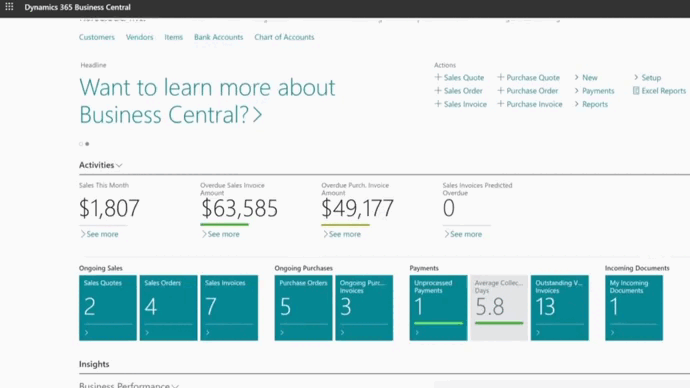Selecting the right ERP can define the future of your business. Among the most debated choices today is NetSuite vs. Dynamics 365 Business Central, two leading cloud ERP solutions that help organizations move beyond spreadsheets and basic accounting software.
Both promise efficiency, scalability, and global reach, but the way they deliver value is very different. In this article, we compare NetSuite vs. Dynamics 365 Business Central across pricing, features, integrations, and long-term strategy so you can determine which solution best fits your business goals.
Why comparing NetSuite vs. Dynamics 365 Business Central matters?
Choosing an ERPis one of the most critical technology decisions a company can make. The right ERP brings together financials, supply chain, operations, and customer data into one system of record. The wrong choice can lock you into high costs, long implementation cycles, and limited scalability.
Two names frequently come up in ERP selection projects: NetSuite vs. Dynamics 365 Business Central. Both are cloud-based systems, widely adopted by SMB and mid-market companies looking to grow beyond entry-level accounting tools such as QuickBooks or legacy on-premises ERP.
At first glance, these systems look similar. They both offer financial management, inventory control, reporting, and automation. But beneath the surface, the differences are significant. From pricing transparency to ecosystem compatibility and long-term AI strategy, the choice between NetSuite vs. Dynamics 365 Business Central can shape your company’s ability to scale.
This article provides an in-depth, structured comparison to help you make an informed decision. Drawing from Gestisoft’s experience as a Microsoft partner and ERP consultant, we will guide you through the key differences and highlight which system might be right for your business.
Speak with an ERP expert today
Contact us to book your free consultation and discover our ERP solutions, tailored for your business.
 Free discovery call
Free discovery call
Quick comparison — NetSuite vs. Dynamics 365 Business Central at a glance
NetSuite, launched in 1998 and acquired by Oracle in 2016, is a pioneer in cloud ERP. It serves more than 37,000 customers worldwide, particularly service-centric businesses, global distributors, and subscription-based organizations.
Microsoft Dynamics 365 Business Central, released in 2018 as the evolution of Dynamics NAV, is designed for SMBs and mid-market companies. With over 60,000 customers globally, it is tightly integrated into the Microsoft ecosystem, making it a natural choice for companies already using Microsoft 365.
At a high level, the difference comes down to this: NetSuite is a single ERP platform designed to cover global operations with strong financials, while Business Central is a flexible, affordable ERP that scales with the Microsoft stack and emphasizes usability, integration, and AI innovation.
Pricing comparison — Business Central vs. NetSuite
NetSuite pricing
NetSuite’s pricing model is not transparent. The base cost typically starts at around $999 per month, with full user licenses beginning at $99 per user per month. However, actual pricing is only revealed during negotiations with Oracle or its partners. Many customers report that NetSuite pricing increases annually by 10% or more, and contracts are often rigid. This lack of transparency can make budgeting unpredictable and challenging for SMBs.
Business Central pricing
Microsoft Dynamics 365 Business Central offers clear, published subscription pricing. The Essentials license is $70 per user per month, while Premium is $100 per user per month. Team Member licenses, which grant read access and limited write capabilities, are available for $8 per user per month. This pricing structure is simple, predictable, and easy to align with business growth.
Gestisoft perspective
For Canadian SMBs, cost predictability is essential. Business Central’s transparent model reduces the risk of unexpected increases and simplifies planning. While NetSuite may appear competitive in some cases, the hidden negotiation-based model creates uncertainty. For organizations that value straightforward licensing and stable long-term costs, Business Central has a clear advantage.

Ecosystem & integration capabilities
Business Central
Microsoft Dynamics 365 Business Central’s greatest strength lies in its seamless integration with the Microsoft ecosystem. Companies using Outlook, Teams, Excel, or SharePoint will find Business Central fits naturally into their daily operations. Employees can send invoices directly from Outlook, collaborate on financial reports in Teams, or analyze ERP data in Excel with no additional connectors.
The Power Platform adds even more value. Power BI delivers advanced reporting and visualization. Power Automateallows workflows across systems to reduce repetitive tasks. Microsoft Copilot brings AI into daily ERP usage, enabling natural language queries, late payment predictions, and product description generation.
NetSuite
NetSuite offers some Microsoft 365 integrations, such as Outlook, but its strength lies in its SuiteApps marketplace, with more than 700 extensions. While this ecosystem is robust, it is not as deeply embedded into a productivity suite as Business Central is with Microsoft 365. Companies running on Google Workspace may find NetSuite’s neutrality a better fit.
Key takeaway
If your organization already runs on Microsoft 365, the integration advantages of Business Central are unmatched. For companies with non-Microsoft environments, NetSuite may provide more flexibility, but it will lack the tight day-to-day collaboration features Microsoft users enjoy.

Core features comparison
Financial management
NetSuite is renowned for its advanced financial features, particularly subscription billing and revenue recognition. It is a strong choice for service businesses, SaaS firms, and companies that must manage complex financial reporting across multiple jurisdictions.
Business Central delivers solid financial management for SMBs, covering general ledger, accounts receivable, accounts payable, cash flow, and tax. While its revenue recognition features are more limited than NetSuite’s, extensions and partner add-ons can fill these gaps. For many SMBs, Business Central’s out-of-the-box functionality is more than sufficient.
Reporting & analytics
NetSuite comes with robust native reporting through SuiteAnalytics and Saved Searches, which enable non-technical users to build dashboards and drill into transactions easily.
Business Central has improved significantly with Analysis Mode, which allows Excel-like exploration of data directly in the ERP. Many organizations pair it with Power BI, Microsoft’s market-leading BI tool, to gain deeper insights, external data integration, and interactive dashboards.
What is the ROI you can expect?
Download your free ROI Excel calculator to find out how much you can save when implementing Business Central today.

Supply chain & manufacturing
NetSuite offers supply chain, inventory, and manufacturing modules, but these typically require additional licensing.
Business Central includes warehouse and supply chain functionality in its base Essentials plan. Manufacturing is available with the Premium license at $100 per user per month. For SMB manufacturers and distributors, Business Central’s built-in features often provide better value.
AI & automation
NetSuite has begun introducing AI features for tasks such as generating product descriptions or supporting invoicing.
Microsoft, however, is far ahead in embedding AI across its ERP and productivity suite. With Copilot, Business Central users can ask natural language questions of their data, predict late payments, and automate content creation. Microsoft’s AI-first strategy ensures these features will expand rapidly, making Business Central a future-proof choice.

Implementation & support
NetSuite
NetSuite’s SuiteSuccess methodology provides a templated, industry-focused implementation approach. While this can speed up deployment, it often leaves less room for customization. Support is largely vendor-driven, with 24/7 availability but centralized processes.
Business Central
Business Central implementations are partner-led, allowing flexibility and tailoring to specific business needs. This adaptability is a strength but also makes the choice of partner critical. Microsoft’s support model relies on its partner network, and the quality of your implementation depends on the expertise of your chosen advisor.
Why the partner matters?
An ERP is only as successful as its implementation. At Gestisoft, we have delivered successful Business Central projects across industries by aligning ERP functionality with business goals. Our local expertise ensures projects remain on budget and on time, while providing ongoing support as your business evolves.

Scalability & long-term vision
NetSuite
NetSuite positions itself as a single ERP platform that can grow with you from SMB to global enterprise. While this scalability is appealing, it often comes at the cost of increasingly complex and expensive contracts. Some organizations also find it difficult to adapt NetSuite to unique processes without customization.
Business Central
Business Central is designed for SMBs and mid-market organizations but scales within the broader Microsoft ecosystem. As needs grow, companies can add Dynamics 365 Sales, Customer Service, or Field Service, along with the Power Platform. The system grows organically with your business, offering modular expansion rather than an all-or-nothing model.
Key takeaway
NetSuite offers a strong single-platform approach, while Business Central provides a scalable ecosystem backed by Microsoft’s continuous innovation. For companies betting on AI and productivity integration, Business Central is positioned as the safer long-term choice.
Which ERP is right for your business?
When to choose NetSuite
- Global operations with complex subsidiaries.
- Strong reliance on subscription billing and revenue recognition.
- Preference for vendor-driven implementations.
- Companies not tied to Microsoft 365.
When to choose Business Central
- SMBs and mid-market firms in North America, especially Canada.
- Organizations already using Microsoft 365 tools daily.
- Companies seeking predictable, transparent pricing.
- Businesses prioritizing AI innovation and modular scalability.
Book your free consultation with our ERP experts today
Contact us to discuss your needs and discover our ERP offerings.
 Free discovery call
Free discovery call
Conclusion — clarity with Gestisoft
Comparing NetSuite vs. Dynamics 365 Business Central reveals that both are powerful ERP solutions. NetSuite shines in global financial management and subscription billing, while Business Central offers a transparent, affordable, and deeply integrated option for SMBs and mid-market firms.
For organizations that rely on Microsoft 365 and value AI-driven innovation, Business Central offers unmatched synergy and scalability. For others seeking a vendor-driven global ERP, NetSuite remains a strong contender.
The most important decision is not only which ERP you choose, but how you implement it. Partnering with Gestisoft ensures that your ERP journey is guided by experts who understand your business context and can tailor a solution for long-term success. Contact us for more information about Business Central and our offerings.
-
NetSuite is a global ERP with strong financial and subscription billing capabilities. Business Central is a flexible ERP designed for SMBs, with deep integration into Microsoft 365.
Liked what you just read? Sharing is caring.

September 26, 2025 by Kooldeep Sahye by Kooldeep Sahye Marketing Specialist
Fuelled by a passion for everything that has to do with search engine optimization, keywords and optimization of content. And an avid copywriter who thrives on storytelling and impactful content.
